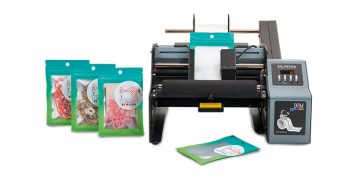Uwafen Seeds is a Chilean company based in San Clemente, 300 km south of Santiago de Chile. It is a leader in the multiplication of high-quality corn seeds free of fungi, discolorations and other unwanted corn species such as dent corn. It serves the world’s leading maize producers offering solutions to meet a wide range of requirements: from hand-pollination to large open field production, including basic seed and increases; genetic purity trials; disease monitoring and flowering trials – all carried out under strict protocol to maintain the confidentiality of the genetic material. “The fundamental principle of our business is to ensure confidentiality, privacy and respect for all information related to the maize seed material provided by our customers for seed multiplication. This honest and trustworthy approach has allowed Uwafen Seeds to build solid and long-lasting relationships with our customers,” says Alejandro Puentes, Seed Processing Manager at Uwafen Seeds.
In addition to its own Experimental Station and Nursery, the company operates a Processing Plant with all the necessary equipment to calibrate, treat and package seeds. This enables its customers to export the seeds directly to the desired market, such as North America, Europe, Asia and Oceania, with the most important markets being the United States, China, Japan, France, Spain and Turkey.
While each customer has specific quality standards, including for different varieties of sweet corn, it is clear that the differentiation between the two species, sweet corn and dent corn, is crucial to ensure high production standards.
 Alejandro Puentes explains: “For us the ability to remove foreign grains in sweet corn seed was key. These can be dent corn or grains with fusarium – a filamentous fungus commonly found in the substrate, which affects not only corn, but also 80 other crops. We had been using the Nimbus 640, which is a good machine, but not advanced enough for this task. That’s why the batches that didn’t reach the required quality with this equipment had to be cleaned by hand, at a very high cost, with no certainty of completion dates, and with extensive reprocessing. We have been working with the TOMRA 5C since March this year. As soon as we installed the machine, we noticed an increase in efficiency. Now, not only can we ensure a high quality of processed maize seed, but we do it in less time, which allows us to improve delivery times to our customers. In addition, we have been able to reduce production costs by about 60% thanks to the high precision of the BSI+ technology.”
Alejandro Puentes explains: “For us the ability to remove foreign grains in sweet corn seed was key. These can be dent corn or grains with fusarium – a filamentous fungus commonly found in the substrate, which affects not only corn, but also 80 other crops. We had been using the Nimbus 640, which is a good machine, but not advanced enough for this task. That’s why the batches that didn’t reach the required quality with this equipment had to be cleaned by hand, at a very high cost, with no certainty of completion dates, and with extensive reprocessing. We have been working with the TOMRA 5C since March this year. As soon as we installed the machine, we noticed an increase in efficiency. Now, not only can we ensure a high quality of processed maize seed, but we do it in less time, which allows us to improve delivery times to our customers. In addition, we have been able to reduce production costs by about 60% thanks to the high precision of the BSI+ technology.”
Uwafen Seeds: a long-standing, strategic relationship
The relationship between TOMRA Food and Uwafen Seeds dates back to 2015, when the Chilean company purchased its first Nimbus 640 for seed grading. Over time, the requirements and production costs increased. To address both, Uwafen Seeds needed a new technology capable of taking the quality of its services a step further.
As Carlos González, Sales Manager Chile for TOMRA Processed Food, part of TOMRA Food, says: “Sweet corn seeds are destined to human consumption, whether fresh, packaged or frozen, while dent corn is for animal consumption. Any contamination in the seed multiplication stage greatly affects the final product. During the process of planting and pollination of maize seedlings, accidental crosses with other unwanted seeds, such as dent maize can happen. This is a major issue, as the presence of this contaminant can mean the loss of complete crop lots. The primary difficulty in the seed sorting process is that the two are so physically alike, that mechanical and manual cleaning methods are not enough. This is where the TOMRA 5C and its BSI+ technology, developed in house, comes into play.”
 TOMRA 5C: highly efficient BSI+ technology
TOMRA 5C: highly efficient BSI+ technology
The TOMRA 5C sorter is perfectly suited to a variety of applications due to the efficiency without equal of the combination of high-resolution laser and BSI technology. With this, the objects can be analyzed not only for color and shape, but also for their biological characteristics, so that these spectrum images identify their unique biometric characteristics.
TOMRA conducted a demonstration at its facilities in Santiago de Chile to identify the technology best suited to sorting the two seeds.
“We sent samples of batches where dent grains hadn’t been completely eliminated with other equipment. I have to say that the result was excellent and better than expected. Although we were not surprised, because we already knew TOMRA’s capabilities,” says Alejandro Puentes.
Fernanda Rubilar, Applications Engineer supporting the Sales Department, explains: “These tests were complicated by the physical similarity of the two seeds, but dent maize has a higher starch content than sweet corn. This generates a different light reflection, and it is precisely this difference that the camera with BSI+ technology can see. No other technology (NIR, RGB camera or laser) can see the difference between the two seeds. This equipment is highly effective. In some species of sweet corn, we can achieve an efficiency of 85% in the first pass of the process and up to 98% in the second pass.”
“The TOMRA 5C we purchased gives us the peace of mind that we are providing our customers with a seed selection service of the highest standard. It is the best equipment on the market. It ensures high productivity at a very low cost compared to manual cleaning, which was previously necessary. We still operate in the same markets as before, but now, thanks to TOMRA, our customers are happy, and we have dramatically reduced our human effort and our costs. I absolutely love the TOMRA technology”, says Alejandro Puentes.
 The seed segment: a niche with great potential
The seed segment: a niche with great potential
The TOMRA Food team in Chile is already conducting trials with other products in response to the growing interest in this type of solutions, both in this market and in the United States. In recent months, successful trials have been completed with other grains and seeds such as wheat, barley, oats, lupine, carrots, pumpkin, watermelon, cauliflower, lettuce, peppers and flowers. In this case, the demonstrations are conducted using a TOMRA 3C, a highly effective laser machine with dual cameras that inspect the product from both sides to detect the most subtle defects in color and shape.




















